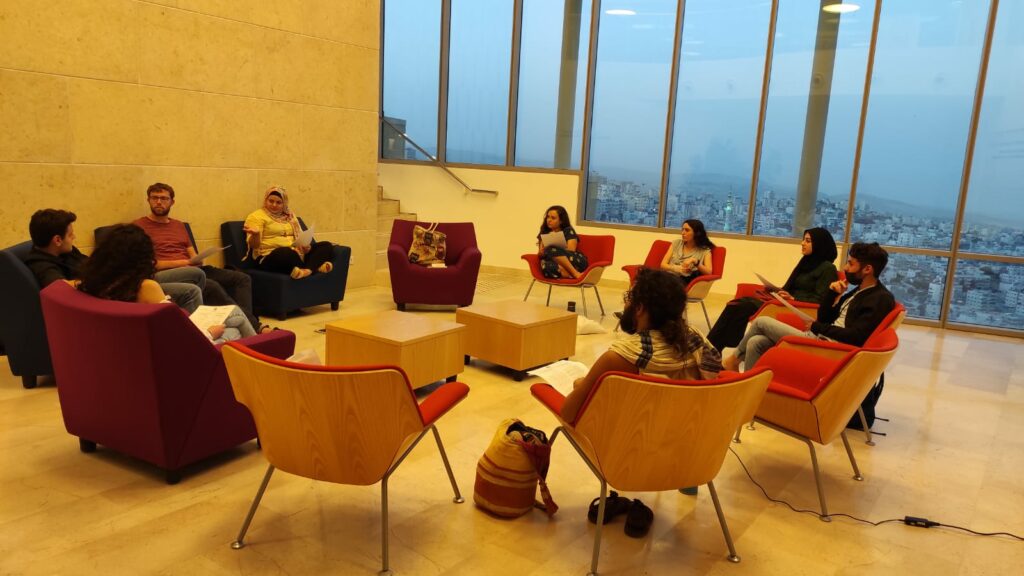On Wednesday May 19th, the current cohort of Russell Berrie Fellows had the opportunity to meet with The Rossing Center for Education and Dialogue, an interreligious organization based in the Holy Land. One of the speakers, Hana Bendcowsky, is the program director of Jerusalem Center for Jewish-Christian Relations (JCJCR), at the Rossing Center for Education and Dialogue and she is involved in many of the Center’s activities including its dialogue programs, producing educational materials, consulting, and advocacy work. Normally, Hana meets the Russell Berrie Fellows in-person because she takes them for a walking study tour in the Christian Quarter in the old city in Jerusalem, but this year she shared her expertise on Jewish-Christian Relation in the Israeli context online.
Hana explained that Jerusalem Center for Jewish-Christian Relations was established by David Rossing in 2004. While he was working in the Ministry of Education, he realised that there was a lack of recognition of the Christian voice by the Jews in the Holy Land. She said that Rossing saw Interreligious Dialogue efforts as very European with Christians being the instigators and the Jewish community the minority; much of the dialogue was only between religious leaders and it focused mostly on history and theology. She explained that here in the Holy Land, that model of dialogue is irrelevant; “we need to talk about things at the grassroots,” she said. The Center was created to increase knowledge, through education and research, into the challenges facing Christian communities in Israel’s Christian-Jewish relations.
The second speaker John Munayer, Communications Coordinator at the Rossing Center for Education and Dialogue, was born and raised in Jerusalem, and has been involved in peace-building and dialogue initiatives from a young age. He explained that the goal of the Rossing Center for Education and Dialogue, as it was renamed afer David Rossing after his death, is to help build an inclusive society and foster better relations between Jews, Christians and Muslims in the Holy Land. To achieve this goal, the organization requires a solid foundation both theologically and theoretically.
John explained that their theological starting point is recognizing human equality being created in the Image of God and celebrating/honouring this diversity. He pointed out that this seems basic but within their context, this is not always seen as a truth therefore it is important to include it. “God’s Truth is bigger than our little limited truths, but these limitations are different lenses we can see the conflict. This implies that we need each other to gain a holistic perspective,” he continued.
John said that the theoretical starting points for their work include building from the grassroots and bringing the everyday people into interreligious engagement. He explained that this requires recognition that people are orientating around religion differently. For example, those with strong cultural perspectives around their religious identity may not hold strong religious beliefs, therefore recognizing the Intersectionality of identities – religious/ ethnic/ national /regional/ gender/ class and more, is important. In their programs they work with laity, women, tour guides, principals, students and work through the education systems to bring another perspective.

All the programs at the Center are meant to bring about action, moving from the table to collective action in order to make a better home for us all based on equality and justice. John said that they “invest in multipliers,” which includes students, teachers and tour guides.
One of their programs, for example, brings students from Israeli and Arab schools together to spend the day at each other’s schools and learn about each other’s culture and religion. Another program brings multicultural groups from abroad to experience the diversity (ethnic, religious, nationalities) in the Holy Land, and leave with greater awareness of the complexities.
They also run programs that give teachers the tools to lead discussions about complex and sensitive topics with students. Hana explains that “we teach Jewish teachers to teach about Christianity and Islam in a more positive and respectful way taking into account all the sensitivities; respectful for the past but looking forward to the future.”
Hana is a professional tour educator and she trains tour guides leading study tours in the Israeli context on how to tell more complex stories. She explains that “Tour guides are multipliers that influence thousands of people every year.“ An example about how to present a story is the Church of the Holy Sepulchre: this is a site run by 5 different Christian communities “How do you present Christainity? Do you talk about them working together or do you talk about this being a place of conflict?“ asks Hana.
Both Hana and John spoke about the unique challenges to doing this work in their context. Choosing which languages and locations to privilege changes the dynamics of the group. “In America, Interreligious Dialogue between Jews and Christians is in English. Which language do you choose in dialogue here? Hebrew, Arabic or English? When you need to talk about such sensitive topics, you need your mother tongue,“ Hana said.
Nothing is neutral and the power dynamics are often skewed which challenges participants to feel comfortable. Working through someone else’s sacred text with respect is difficult. Hana explained that “people approach these texts differently so we must be careful.”
Because of the conflict, some people don’t feel physically safe coming to meetings. The speakers were asked how the current situation is influencing their work and Hana responded with a question: “We’ve been through similar times in the past and we’ve experienced violence in different contexts. When it happens, do you give up and go home or do you realize how much more work there is to do?“
